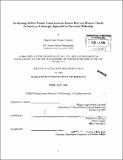| dc.contributor.advisor | Frederick P. Salvucci. | en_US |
| dc.contributor.author | Molina Cecchetti, Miguel Angel, 1979- | en_US |
| dc.contributor.other | Massachusetts Institute of Technology. Dept. of Civil and Environmental Engineering. | en_US |
| dc.date.accessioned | 2006-03-24T18:14:19Z | |
| dc.date.available | 2006-03-24T18:14:19Z | |
| dc.date.copyright | 2004 | en_US |
| dc.date.issued | 2004 | en_US |
| dc.identifier.uri | http://hdl.handle.net/1721.1/30042 | |
| dc.description | Thesis (S.M.)--Massachusetts Institute of Technology, Dept. of Civil and Environmental Engineering, 2004. | en_US |
| dc.description | Includes bibliographical references (p. 130-135). | en_US |
| dc.description.abstract | This thesis applies Lean Principles and Practices to the public transportation services sector. It is an innovative approach since the area of knowledge is most actively used in the production and manufacturing field. Other theories, Stakeholder Theory, Systems Theory, and Transaction Cost Economics, have been incorporated to complement lean thinking and create a strategic management framework for studying airport rail and remote check-in (ARRCI) systems as enterprises. The purpose of using lean and elements of these research areas is to better understand the relationship between two critical and most salient stakeholders, airlines and ARRCI operators. The underlying hypothesis is if the values and vision of these two stakeholders are aligned, then performance improves as the friction impacting the cooperation is structural waste eliminated. The framework for analyzing ARRCI systems is mostly lean thinking. An original development in this thesis is the integration of transaction cost economics to the lean methodology allowing a better comprehension of the interactions between airlines and rail service operators. The new association was applied to three ARRCI cases. Together they provide a source of experiences which should be considered as examples for new systems in the future. Several important observations and conclusions, an analytical framework for understanding airport rail systems in general, and recommendations were derived using the approach demonstrating its advantages and capabilities. Public/private ventures to create ARRCI systems are under development in United States' cities and elsewhere. The public interest is clearly defined, with social benefits justifying this policy. | en_US |
| dc.description.abstract | (cont.) What remains, and is pursued here, is the identification of the benefits for the airlines involved since their active participation is important for successful implementation, and their passengers are the end users of the service. | en_US |
| dc.description.statementofresponsibility | by Miguel Angel Molina Cecchetti. | en_US |
| dc.format.extent | 135 p. | en_US |
| dc.format.extent | 8052364 bytes | |
| dc.format.extent | 8052171 bytes | |
| dc.format.mimetype | application/pdf | |
| dc.format.mimetype | application/pdf | |
| dc.language.iso | eng | en_US |
| dc.publisher | Massachusetts Institute of Technology | en_US |
| dc.rights | M.I.T. theses are protected by copyright. They may be viewed from this source for any purpose, but reproduction or distribution in any format is prohibited without written permission. See provided URL for inquiries about permission. | en_US |
| dc.rights.uri | http://dspace.mit.edu/handle/1721.1/7582 | |
| dc.subject | Civil and Environmental Engineering. | en_US |
| dc.title | Evaluating airline-transit cooperation in airport rail and remote check-in services : a strategic approach for increased ridership | en_US |
| dc.type | Thesis | en_US |
| dc.description.degree | S.M. | en_US |
| dc.contributor.department | Massachusetts Institute of Technology. Department of Civil and Environmental Engineering | |
| dc.identifier.oclc | 55589263 | en_US |
